Trends, new releases and more @ufl_group | ufl.co.nz
Salone del Mobile and Milan Design Week 2024
In April, Milan hosted the 62nd edition of Salone del Mobile, attracting nearly 400,000 visitors worldwide. Sustainability and wellbeing were key talking points, alongside the blending of hospitality and workplace, a focus on craftsmanship, and the seamless integration of technology into furniture design.
Citywide collaborations created buzz with captivating installations and activations, with a theme of Materia Natura emphasising circularity and material choices.
Milan’s architectural marvels and timeless elegance provided a perfect backdrop.
Among its brutalist buildings, opulent palazzos, cobbled lanes, and green courtyards, tradition and modernity blend effortlessly, highlighting its dedication to design excellence.
While Milan Design Week involves endless walking, indulgent spritzes, and some sleeplessness, its core is the sharing of ideas and discussing how design can enhance our lives.
Back home, we reflect on the key themes and unveil the latest releases from this year’s Italian design extravaganza.



New to 2024 and beyond

At UFL we are dedicated to bringing original furniture designs to the New Zealand interiors market, giving our clients something they won’t find anywhere else.
This year, key trends centred around reducing waste and designing better manufacturing systems that create a positive -rather than just neutral - impact on the environment.
Think circular (sustainable), quirky and innovative solutions, modular designs, alongside bold and vibrant colours that reflect an optimistic future. 2024 is set to be a game-changer.

Circular ways of thinking
The theme for Salone del Mobile was Materia Natura, exploring sustainable design by linking matter and nature. Installations, exhibitions, and new product launches focused on circular economy, reuse, and sustainable materials, from innovative biomaterials to recycled products.
A stand-out installation, “Hello, Earth Speaking” by The Good Plastic Company at Superstudio, showcased circular design with a sculpture of Earth crafted from recycled materials like refrigerator insulation, CD cases, and single-use items. Their Take-Back Programme ensures recycling for future projects.

UFL PROMISE:
AS CHAMPIONS OF SUSTAINABILITY AND INNOVATION, WE EMBRACE THESE CIRCULAR WAYS OF THINKING, CURATING PRODUCTS THAT NOT ONLY ELEVATE SPACES BUT ALSO CONTRIBUTE TO A MORE SUSTAINABLE FUTURE.
Meanwhile, innovative mediums like paper pulp took centre stage, offering a creative solution for waste reduction. Singaporean designer Emeline Ong creating pastel-coloured tables and wall hooks from discarded schoolwork, highlighting sustainable design's beauty.
Andreu World’s Bolete collection by Patricia Urquiola, using BIO® thermopolymer from natural sources (100% compostable and biodegradable), demonstrated ecological design’s potential without sacrificing aesthetics or functionality.

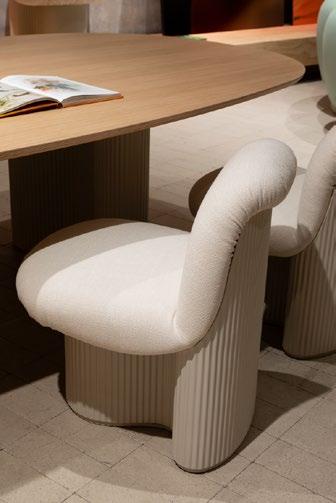
Within the historic walls of Teatro Gerolamo, Formafantasma’s Earthic Lab installation challenged conventional notions of production ethics. Collaborating with Cosentino, the studio transformed waste into luxury, utilizing debris from production processes and cooking oil in resin, while incorporating recycled glass and plastic fragments into the surfaces.
 ABOVE: PAPER PULP TABLES BY EMELINE ONG.
ABOVE: BOLETE BY PATRICIA URQUIOLA FOR ANDREU WORLD.
ABOVE: UPCYCLED SURFACES BY EARTHIC® LAB X FORMAFANTASMA
ABOVE: PAPER PULP TABLES BY EMELINE ONG.
ABOVE: BOLETE BY PATRICIA URQUIOLA FOR ANDREU WORLD.
ABOVE: UPCYCLED SURFACES BY EARTHIC® LAB X FORMAFANTASMA


The rise of segmented furniture
A Modern Twist on 1970s Inspiration: In homage to the influential decade’s 50th anniversary, designers are rediscovering the allure of 1970s interiors, bringing forth a resurgence of overstuffed pieces (think Ubald Klug and Mario Bellini), rattan sets, and sinuous shapes. While conversation pits and sleek sofas continue to captivate, a new and more subtle wave of 70s inspiration emerges in the form of modular segmented seats.
TREND 02At the forefront of this trend is a reinterpretation of classic designs, blending nostalgia with contemporary flair. Snøhetta’s bio-foam-filled sofa for MDF Italia, reminiscent of de Sede’s iconic DS600 but with a softer, more tactile appeal, stole the spotlight at Acerbis’ Salone booth. Desalto also made waves with their candy-coloured loungers, featuring plush units flex into several positioned designs.
Everywhere we looked, stacked segmented furniture featured injected foam rolls we on display. As we celebrate the enduring legacy of 1970s design, the evolution of segmented furniture stands as a testament to the timeless appeal of modularity and versatility in modern interiors.



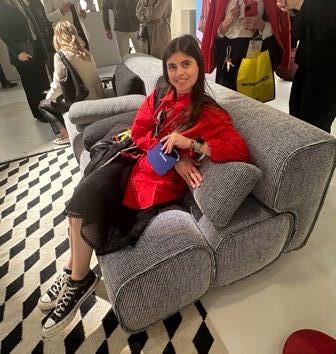

TREND 03
A vibrant revival
At this year’s Salone del Mobile, a vivid and daring embrace of colour stole the spotlight, signalling a departure from the subdued tones that once dominated exhibitions. While natural hues still hold their place, a resurgence of bold colours has ignited a sense of playfulness across the design landscape.

With these vibrant hues and textures, designers have unleashed a whimsical array of colours, breathing new life into furniture design. This daring use of colour represents a shift towards adventurous and eclectic expressions, pushing the boundaries of conventional design norms.
At UFL, we celebrate this resurgence of bold colours, recognizing the power of colour to invigorate and inspire. Join us as we embrace this colourful revolution, where every shade tells a story, and every piece of furniture becomes a canvas for self-expression.





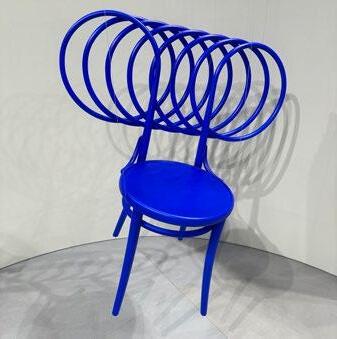

Soft, pillow-like seating
Milan Design Week 2024 showcased an abundance of oversized pieces featuring pillow-like seating with big comfy arms. There was a nod to embracing softer, more fluid shapes and curved furniture. From sinuous sofas to sculptural armchairs, this trend marked a departure from rigid lines in favour of organic curves.

These inviting designs prioritise comfort and relaxation, offering a cosy sanctuary within interior spaces. With their generous proportions and plush upholstery, these pieces redefine the concept of lounging, inviting users to sink in and unwind in style.
Drawing inspiration from Ubald Klug’s stacking approach, brands like Tacchini put their own spin on modular design with their Faye Toogood’s lunar-inspired collection – literally calling you to crash land on their sofas.





Navigating the highlights
Beyond the bustling fairgrounds, Milan Design Week spills into the streets, parks, and hidden corners of the city, transforming it into a vibrant playground of creativity. From pop-up installations to immersive experiences, the exhibitions outside the main event offer a kaleidoscope of design inspiration, inviting visitors to explore and engage with design in unexpected ways.
Curating a ‘best of’ during Milan
Design Week is no small feat. With an overwhelming array of exhibitions and events, we put on our most comfortable shoes and embarked on a whirlwind tour to see as much as possible.
Amid crucial meetings with valued suppliers, we navigated through throngs of visitors to experience stand-out exhibitions. This year’s edition buzzed with heightened excitement, drawing crowds from beyond the design industry to iconic events like Hermès’s interiors collection launch, the Loewe Lamps launch, and the Bottega Veneta x Cassina collaboration paying homage to Le Corbusier.
Other highlights included Unikko Café by Marimekko: a pop-up café bringing to life Marimekko’s iconic print in an immersive, bold setting; Design Space AlUla by Paul Cournet and Sabine Marcelis: a lounge celebrating the culture and design of the Saudi Arabian region AlUla; “Emotions of the Sun” by Champagne house Veuve Clicquot: an immersive photography installation; more design delights at Barazante Ateliers; and so much more.


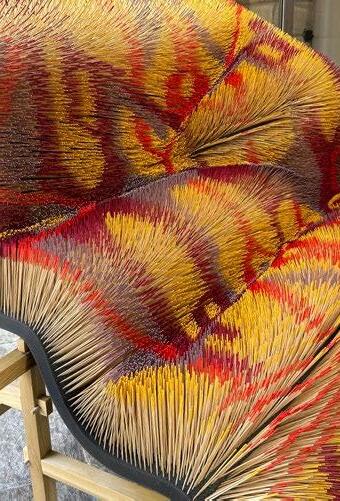




Andreu World
UFL and Andreu World share a cherished partnership spanning more than two decades, rooted in a mutual dedication to excellence in design and sustainability. As our trusted brand, Andreu World continues to pioneer furniture solutions tailored to the evolving needs of modern living and working environments, prioritising both environmental stewardship and people’s well-being.




During Milan Design Week, Andreu World welcomed clients to their new showroom, a testament to their unwavering commitment to sustainability and innovation. The showroom, crafted with the same ecoconscious principles as their product line, provided a platform for engaging discussions on design and sustainability, complemented by the unveiling of their latest collections.
Among the highlights were the extension of the Bolete BIO® collection, featuring modular sofa systems and versatile outdoor furniture designed by renowned talents such as Patricia Urquiola and Benjamin Hubert. Additionally, the launch of new outdoor collections designed by Alfredo Häberli, Piergiorgio Cazzaniga, Alberto Lievore, and Patricia Urquiola further underscored Andreu World’s Mediterranean heritage and dedication to eco-friendly practices.
Each piece showcased during the fair embodies Andreu World’s commitment to the circular economy, utilizing sustainable materials such as FSC® certified wood, BIO® thermopolymers, and Pure ECO® textiles. These innovative designs not only reflect Andreu World’s ethos of sustainability but also offer timeless elegance and unparalleled comfort for discerning customers seeking responsible furniture solutions.


Sancal
Sancal stands out in the design world for its fearless approach to innovation and refusal to conform to trends. Despite this, they consistently deliver design-led, commercially-driven products imbued with a playful twist that sets them apart. As a supplier, Sancal’s commitment to pushing boundaries aligns perfectly with UFL’s ethos of offering unique and forwardthinking furniture solutions.
During Milan Design Week, Sancal’s stand made a bold statement on sustainability, opting for recyclable metal scaffolding and printed sheets to create a freely accessible and creatively sustainable space.
Titled “UnRoom,” the exhibition curated by Estudio Sancal was a deconstructive manifesto challenging traditional notions of inhabiting spaces. It invited reflection, experimentation, and reinvention, prompting visitors to rethink their relationship with the environment and the resources they consume.
The rustic yet minimalist aesthetic of the stand allowed Sancal’s furniture to take centre stage, emphasizing their timeless design and impeccable craftsmanship. The concept garnered attention for its innovative approach to sustainable exhibition design.







At the heart of Sancal’s philosophy is a commitment to ethical values and environmental responsibility. The UnRoom exhibition served as a platform for dialogue on the role of design in society and the imperative to adopt more sustainable practices. Through their collections, Sancal strives to marry classic and contemporary elements while prioritizing the well-being of users and minimizing their environmental footprint.


In line with this ethos, Sancal unveiled a range of new products at Salone del Mobile, including Modular seating solutions Cita by Note, Canto by Mut with matching side tables, Vibe sofas and armchair by Estudio Sancal, as well as the Seta by Geckeler Michels, a small and practical trolley. They also presented new variants of the Bold table by Studiopepe, as well as a new version of Sylvain Willenz’s Body chair for auditoriums.
These innovative designs reflect Sancal’s dedication to quality, durability, functionality, and responsibility, reaffirming their position as a leader in the design industry.

LaCividina
LaCividina, a family-run company founded in 1976, has become synonymous with meticulously crafted furniture and iconic designs like the Osaka, designed by Pierre Paulin. Their unwavering commitment to quality and creativity has made them a valued partner for UFL.
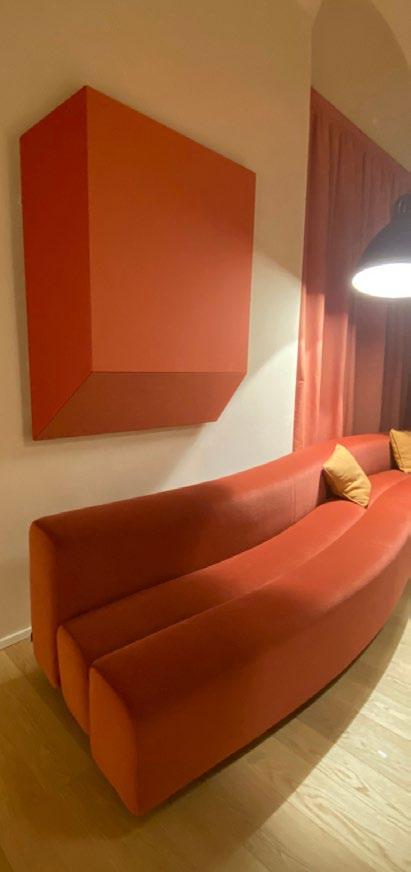
During Milan Design Week 2024, LaCividina presented ‘Human Made’, an installation in their new permanent showroom that seamlessly blended the company’s technical expertise with the creative vision of Studio Salaris, led by Alessandra Salaris. This collaboration resulted in a project that transcended mere product display, embracing sustainability, thematic coherence, and a profound respect for history and territory. ‘Man-made’ was the central theme of the exhibition, highlighting the significance of human intervention in creating objects and products. Studio Salaris drew inspiration from classical architectural elements like columns, re-imagining them in a contemporary context. This concept not only honoured LaCividina’s historical roots but also reflected their commitment to innovation and design excellence.
Through an immersive experience, visitors were guided through a visual and conceptual journey, exploring LaCividina’s philosophy and creations while emphasizing sustainability and ethical production practices. The exhibition also introduced LaCividina’s new collection, Apper, which embraced the trend of large, oversized, and curvaceous shapes dominating Milan Design Week. Upholstered with high-quality fabrics like Kvadrat’s Arda, the collection showcased LaCividina’s dedication to aesthetic purity, material quality, and environmental responsibility, reaffirming their position as leaders in the design industry.


Vondom
Vondom, based in Spain, stands as a beacon of avant-garde furniture and indoor/outdoor lighting. Renowned globally for their mastery in producing roto-moulded products, they’ve continuously led the charge in innovation, particularly with their trailblazing illuminated furniture. Collaborating with esteemed designers, Vondom infuses each piece with magnificent shapes and cultural influences, creating exclusive expressions of their distinct “Vondom” style. This year’s showcase at Salone del Mobile further exemplified their commitment to pioneering excellence, with each collection displayed representing a departure from their standard offerings while maintaining their hallmark blend of aesthetics and functionality.

Vondom’s showcase at Salone del Mobile in Milan highlighted a range of innovative and elegantly designed collections. Luna, by Ramon Esteve, pays homage to iconic designers with avantgarde materials and bold forms, embodying the democratization of design with soft lines and organic curves.
Milos, by Jean Marie Massaud, blends simplicity and functionality for outdoor comfort, earning a prestigious award for its design. Tulum, by Eugeni Quillet, showcases Vondom’s evolution with a blend of natural materials and cutting-edge technology, emphasizing both innovation and timelessness.
Hamptons, also by Esteve, epitomizes sophistication in outdoor furniture with meticulous fabric selection and luxurious design.
Further pushing the boundaries of design, Origami, inspired by Japanese artistry, creates captivating outdoor pieces with geometric shapes that play with light and shadow. Skull, combining functionality with avant-garde aesthetics, features planters, stools, and tables with a signature faceted skull motif, transforming spaces into extraordinary settings. These collections reflect Vondom’s commitment to innovation, functionality, and contemporary aesthetics, continuing to push the envelope in modern design.




Artifort

Taking ‘Bold Visions’ as its theme, Artifort launched two new sofa concepts in 2024: Muse and Forte. Muse is the name of the latest social furniture designed by Monica Förster. An elegant masterpiece in simplicity, showcasing the ingenuity of Artifort’s development team. It pays homage to the soft, organic Artifort designs of the 1960s and 1970s.



Forte, designed by Studio Stefan Scholten, emphasises luxury, elegance and comfort with its deeper seating comfort. The sofa programme is launched with a matching series of Forte Table coffee tables in luxurious finishes such as Italian marble and solid oak wood. Alongside the introductions, two design icons by Geoffrey D. Harcourt RDI return to the market: swivel chairs F504 and F506.
Artifort, of The Netherlands, has been producing distinguished, comfortable, and functional furniture since 1890. The Artifort collection is characterized by innovative, colourful, and timeless design with a recognizable shape. With the 2024 novelties, Artifort underlines its expertise in creating artistic, timeless, and comfortable high-quality furniture for homes, offices, hospitality, and public spaces, solidifying its reputation as a leader in the industry.”
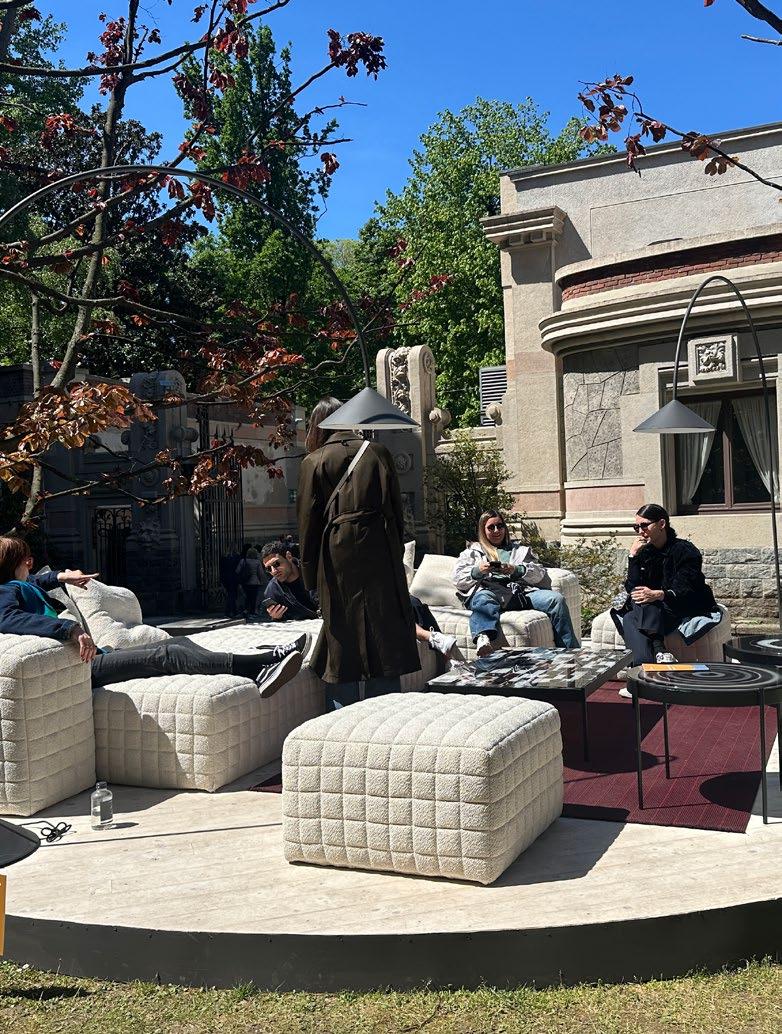
For nearly three decades, Enea has stood as a stalwart supplier to UFL. Renowned as one of our most valued partners, together we have revolutionised educational institutions, workspaces, and airport terminals throughout New Zealand. During the bustling Milan Design Week, Enea embarked on a departure from the conventional Salone fairgrounds, opting instead to unveil their offerings in a fresh context alongside their Spanish counterparts.



The second edition of the Appartamento Spagnolo served as a platform for 18 Spanish furniture and interior brands to showcase their latest products within the historic Palazzo Castiglioni in Milan.
Curated by Elle Décor Italia in collaboration with the architecture studio DWA, the Appartamento Spagnolo spanned six distinct spaces, including interior rooms, a winter garden, and an outdoor patio. The installation not only highlighted the innovation and craftsmanship synonymous
with Spanish design but also provided guests with a bespoke experience to explore its curated spaces, immersing themselves in a diverse array of furniture, lighting, art, and accessories.
Along with Vondom, Enea leveraged this platform to unveil their latest designs, including the new Kua Lounge chair, set within the context of a beautifully curated domestic setting, evoking a sense of everyday elegance.
LZF Lamps illuminated Milan Design Week 2024 with their iconic wooden creations and cutting-edge designs, offering a fusion of functionality and artistic beauty that captured our imagination. From the moment we stepped into their universe, we were immersed in a realm of light, creativity, and elegance, a true testament to LZF Lamps’ visionary ethos.

Curated by the renowned London-based designer Bodo Sperlein, known for his exceptional creativity and innovative spirit, the 'Menu 1' exhibition stood out as a transformative highlight of the week. Nestled within the historic Sant'Angelo Monastery in the prestigious Brera Design District, this exhibit unfolded within the architectural marvel designed by the iconic Milanese architect Giovani Muzio in the 1930s. It marked the venue's debut at Milan Design Week, offering a captivating setting with its garden terraces and cloisters, creating a serene yet dynamic backdrop for the showcase.
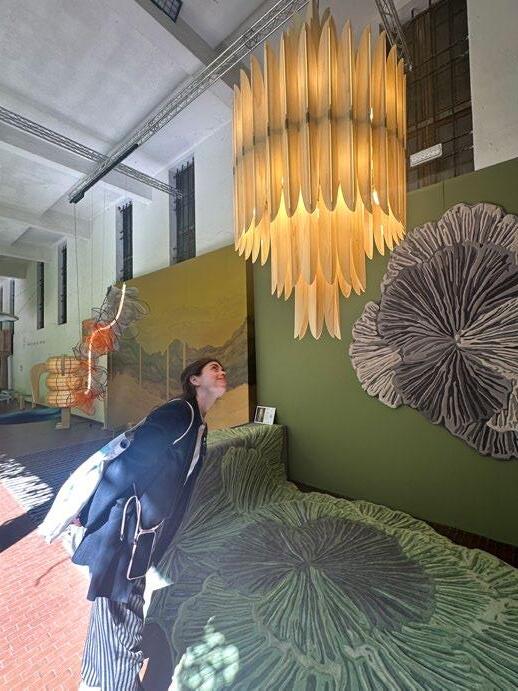




'Menu 1' epitomized the themes of materiality and sustainability, perfectly aligned with this year's 'Materia Natura' theme of Fuorisalone. The exhibition showcased LZF Lamps' highly anticipated Wave collection by Bodo Sperlein, crafted from solid wood to accentuate the inherent beauty and durability of natural materials. Alongside other collections, 'Menu 1' invited attendees on a sensory journey through designs that spoke volumes about innovation, sustainability, and the seamless integration of nature and craftsmanship.
LZF Lamps elevated this space, unveiling the flexible version of Candela Cort's Cloud and the Voliere by Bodo Sperlein. These pieces epitomized LZF's dedication to innovative design, effortlessly combining functionality with artistic elegance in an unforgettable showcase.


Nanimarquina
Nanimarquina, renowned Spanish brand, showcased their latest collection during Salone del Mobile. Known for their exceptional craftsmanship and innovative designs, Nanimarquina presents a unique blend of tradition and modernity in their rugs and carpets. This year, their exhibition emphasized sustainability and material innovation, reflecting their commitment to environmental responsibility. With a focus on quality, creativity, and respect for artisanal techniques, Nanimarquina continues to inspire with their timeless creations.


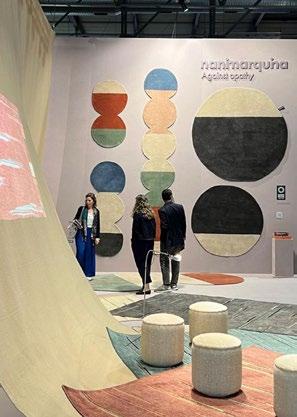

Our visit to the Nanimarquina stand at this year’s Salone del Mobile in Milan was a standout. We explored the latest collections, which continue to redefine contemporary rug design.
Pearls by Sabine Finkenauer: Featuring bold patterns and soft textures inspired by the organic shape of pearls, this collection brings sophistication and natural elegance to any space.
Colorado by Inga Sempé: With vibrant colour contrasts and geometric patterns, this collection offers a contemporary take on handmade rugs, blending artistic flair with functionality.
Wabisabi by Nani Marquina: Drawing inspiration from the Japanese aesthetic of wabisabi, this collection celebrates imperfection and authenticity through irregular textures and unconventional materials, fostering a sense of calm and contemplation.
Chillida by Eduardo Chillida: A tribute to artist Eduardo Chillida, this collection embodies strength and movement, translating elements of his renowned sculptures and engravings into monumental rug designs.
These new additions not only offer a diverse range of styles and palettes to suit various interiors but also uphold ethical and sustainable practices. The collections represent a significant step forward in rug design, enriching living spaces while upholding ethical and environmental values. Each acquisition supports traditional craftsmanship and contributes to meaningful social initiatives.

Our expert eye.
Juliana Reesby has been immersed in the commercial interiors industry for most of her working life. The Reesby family established UFL as industry leaders in 1968 and continue to own and operate it to this day. With a deep passion for interiors, art, and design, Juliana thrives on the immersive experience that Milan Design Week offers. Throughout the week, she tirelessly explored future trends, engaged with designers, and enthusiastically sought to bring the very best of Milan Design Week back to New Zealand.


Contact us
Salone del Mobile and Milan Design
Week 2024 was a showcase of innovation, creativity, and sustainability, with exciting trends and new releases shaping the future of design.
If you’d like to learn more about any of these products featured, or discuss an upcoming project please contact us. We would love to work with you.
Showroom
308 Rosebank Road Avondale, Auckland
Monday to Friday, 9am-5pm
Enquiries
P. +64 9 828 1000 info@ufl.co.nz ufl.co.nz
